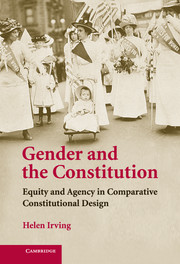8 - Reproductive Rights
Published online by Cambridge University Press: 08 December 2009
Summary
All women have in common the historical and persistent experience of subordination qua women. This distinguishes them from men, as a class, but with respect to the law, it is possible at least to imagine the ultimate success of remedies that are designed to eliminate this distinction. That is to say, as a status distinction, subordination is contingent, not inherent, and the goal of feminist law is to overcome it, not accommodate it. But are there inherent qualities or attributes that render gender differences permanent and that need to be addressed separately in constitution making? This question must be asked with a sharp eye to history. Many purported distinctions in capacity or temperament that were once considered inherent and unchangeable, and many of which were once incorporated into law, have proven illusory or mutable over time or, at the very least, have become irrelevant to law or policy.
However (unlike in most other cases of status discrimination), even full achievement of formal equality and comprehensive demonstrations of equal capacity would still leave women different from men. A fundamental difference would remain. Women bear and give birth to children, where men do not. This is not a purely contingent difference that becomes inconsequential if abstracted from culture or history (as skin color, for example, does). It endures and remains significant at any time and in any part of the world. The reproductive role of women is, similarly, not merely commensurate with or complementary to the reproductive role of men.
- Type
- Chapter
- Information
- Gender and the ConstitutionEquity and Agency in Comparative Constitutional Design, pp. 191 - 218Publisher: Cambridge University PressPrint publication year: 2008



